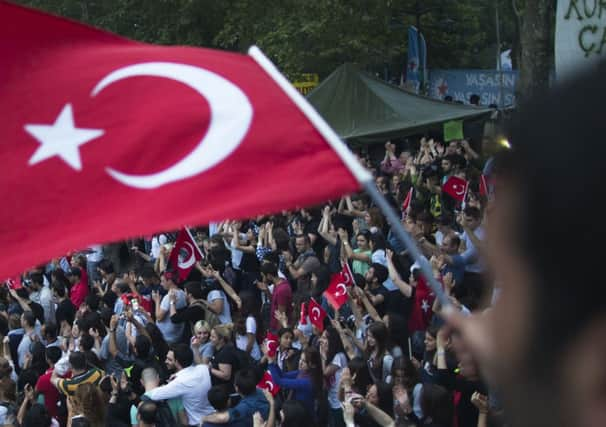Book review: Turkish Awakening by Alev Scott


Turkish Awakening: A Personal Discovery Of Modern Turkey
Alev Scott
Faber & Faber, £14.99
WHEN Alev Scott moved to Turkey three years ago, she was looking for her roots. The daughter of a British father and a fiercely patriotic Turkish mother, she did not know the language and had no Turkish friends. Her journey of discovery ranged from centuries-old camel wrestling to a £250 million new ski resort, where the call to prayer echoes over the slopes.
Two years later, she was about to finish this book when the Gezi Park protests began in Istanbul, spreading rapidly across the country. The demonstrations and the Turkish government’s reaction to them – followed by corruption allegations this winter – shook Turkey, along with foreign perceptions of the country, in ways that have yet to be played out. They forced the personal into the political.
Advertisement
Hide AdMy wife and I went through something mildly similar. We moved to Istanbul for three months last year, empty-nesters on a mid-life jaunt, and had started learning Turkish just as Gezi began. “No-one expected the protests,” Scott writes. While those who took to the streets showcased the “passion, courage, and humility” of people waking up to what they wanted from democracy, they also faced condemnation by the government and “many Turks who saw them as traitors”.
About 2.5 million Britons visit Turkey every year. It’s never been easier to get there or to get around within Turkey. In Istanbul, you can make the crossing from Europe to Asia in four minutes, by the new subway under the Bosphorus. Buses between Istanbul and Ankara have better wifi than the East Coast rail line, while internal flights are plentiful and often cheap.
There has also never been a more compelling time to learn about Turkey. Key municipal elections in the biggest cities are weeks away, with a presidential poll in the summer. The country, with its new model of Islamic democracy at a crossroads, remains both bridge and bulwark between Europe and democratically challenged Asia, not to mention the Syrian horror.
For beach reading on the Mediterranean coast, even the most tunnel-visioned punter may be minded to swap a bodice-ripper for a book that tries to explain what is going on in Turkey. Chatty, engrossing, modest and gutsy, and in the end surprisingly moving, Turkish Awakening deserves a place with the suncream and sand.
My own non-fiction reading list on Turkey would still begin with Andrew Mango’s gripping biography of Attaturk, and include Phillip Mansel’s guide to fratricidal Ottoman politics in Constantinople. There’s Andrew Finkel’s racy primer, Turkey: What Everyone Needs To Know, which perhaps needs a post-Gezi updating, and for a quirky historical outing, try Selçuk Altun’s novel Emperor Of Byzantium.
What all of these excellent guides to Turkey have in common – and one should, of course, also add to the list the novels written by Nobel laureate Orhan Pamuk – is that they are all written by men. A woman’s interpretation of the country in English has long been missing, and although Scott’s book has its faults – it skirts round the basics, is opinionated and sometimes irritating – it is also thoroughly readable, especially in providing insights from a feminine perspective. Thus we learn, for example, why a friend of Scott’s boyfriend won’t shake her hand, and how women who cover their heads for religious reasons get on with those who refuse to do so – something that mystifies many first-time visitors.
Advertisement
Hide AdI much enjoyed her description of the new Turkish skiing resort at Erciyes, with its imported Austrian ski instructors and a restaurant reached by gondola in a conservative place where uncovered women are the exception and the après-ski scene is mostly dry (rather a relief, in my view). She is also good on Ibrahim Tatlıses (“Abraham Sweet Voice”), the Kurdish-Arabesque pop singer, actor, and kebab chain and bus company entrepreneur.
The Gezi Park protests may have forced their way late into Scott’s book, but by the end she has incorporated it in some of her most telling passages. They include, for example, the scene where she is wheezing with teargas, and comforted by an elderly lady pouring soothing lemon-scented cologne into Scott’s cupped hands, which she splashes on her face. “This was pure Turkish magic: a traditional gesture of hospitality transformed into makeshift first aid,” she writes.
Advertisement
Hide AdA few pages later, there is the altogether sadder description of a friend, at first passionately involved in the demonstrations, whose “hope and energy left him” after the government crackdown. Between the two of them, Turkey’s future still lies unwritten.